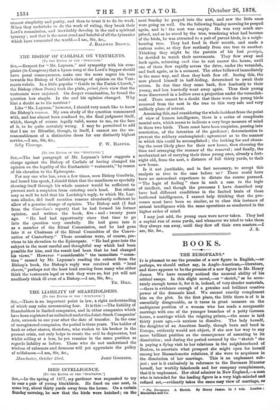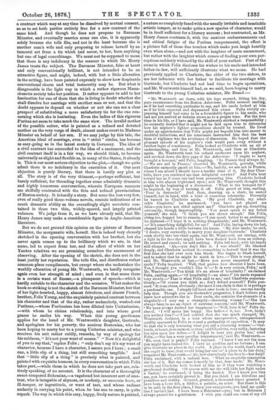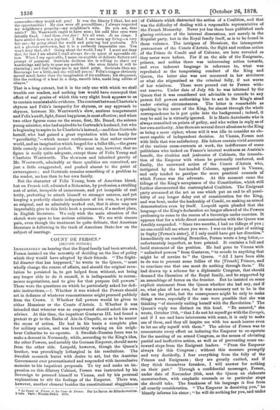BOOKS.
THE EUROPEANS.*
IT is pleasant to see the promise of a new figure in English,—or perhaps, we should rather say, in Anglo-American,—literature,. and there appears to be the promise of a new figure in Mr. Henry James. We have recently noticed the unusual ability of his critical essays. In this slight novel,—or " sketch," as he accu- rately enough terms it, for it is, indeed, of very slender materials,. —there is evidence enough of a genuine and brilliant creative- power of the dramatic kind. We cannot exactly compliment him on the plot. In the first place, the little there is of it is essentially disagreeable, as it turns in great measure on the ambiguous position of a woman who has made a morganatic- marriage with one of the younger branches of a petty German house, a marriage which the reigning prince,—the scene is laid, thirty years ago,—is anxious to dissolve. The lady herself, the daughter of an American family, though born and bred in Europe, evidently would not object, if she saw her way to any more brilliant position as the consequence of assenting to its dissolution ; and during the period covered by the " sketch " she is paying a flying visit to her relations in the neighbourhood of Boston, to ascertain what prospect she might open for herself among her Massachusetts relations, if she were to acquiesce in the dissolution of her marriage. This is an unpleasant sub- ject; nor is it exclusively in reference to the Baroness Miinster herself, her worldly falsehoods and her company complaisance, that it is unpleasant. Her chief admirer in New England,—a man who is intended for the 1e ding figure in a very high-minded and refined set,—evidently takes the same easy view of marriage, as • The Europeans. A Sketch. By Henry James. In 2 yob. London;. Macmillan and Co. a contract which may at any time be dissolved by mutual consent, so as to set both parties entirely free for a new contract of the same kind. And though he does not propose to Baroness Minster, and eventually marries some one else, it is apparently solely because she tells fibs, and not in the least because she is another man's wife and only proposing to release herself by an immoral act from a tie which had never, to her, been anything but one of legal concubinage. We must not be supposed to mean that there is any indelicacy in the manner in which Mr. Henry James treats the subject. The Baroness Miinster, false at heart and only conventionally brilliant, is not intended to be an attractive figure, and might, indeed, with but a little alteration in the setting, have been painted expressly to show how despicable eonventional charm and total insincerity may be. But what is disagreeable is the light way in which a rather rigorous Massa- chusetts society take her position. It rather appears to add to her fascination for one of them that she is living in doubt whether she shall dissolve her marriage with another man or not, and that the doubt appears to depend on whether or not she can see a clear prospect of substituting a more satisfactory tie for the one con- cerning which she is hesitating. Even the ladies of this rigorous Puritan set seem to take ranch the same view. The invalid mother of the possible suitor, who is painted as a refined and devoted mother on the very verge of death, almost makes court to Madame Munster on behalf of her son. If we may judge by this tale, the American ideal of marriage, even in " strict" circles, has become as easy-going as in the laxest society in Germany. The idea of a civil contract has succeeded to the idea of a sacrament, and the civil contract itself is in a fair way, we should think, to become universally as slight and flexible as, in many of the States, it already is. This is our most serious objection to the plot,---though we quite admit there is no indelicacy in the execution of it. Our next objection is purely literary, that there is hardly any plot at all. The story is of the very thinnest,—perhaps sufficient, but barely sufficient, for threading together some admirably dramatic and highly humorous conversation, wherein European manners are skilfully contrasted with the thin and refined provincialism of Boston society. It is hardly a story. But none the less very few, even of really good three-volume novels, contain indications of so much dramatic ability as the exceedingly slight novelette con- tained in these two thin, widely-spaced, and largely printed volumes. We judge from it, as we have already said, that Mr. Henry James may make a considerable figure in Anglo-American literature.
But we do not ground this opinion on the picture of Baroness Munster, the morganatic wife, herself. She is indeed very cleverly sketched in the opening conversation with her brother, but she never again comes up to the brilliancy which we are, in that scene, led to expect from her, and the effect of which on her Yankee relatives we are promising ourselves the amusement of observing. After the opening of the sketch, she does not in the least justify her reputation. She tells fibs, and distributes rather common-place compliments, but except where she undertakes the worldly education of young Mr. Wentworth, we hardly recognise again even her strength of mind ; and even in that scene there is a certain want of finesse,—a plumpness of speech—which is hardly suitable to the character and the occasion. What makes the book so striking is not the sketch of the Baroness Munster, but that of her light-hearted, happy, almost frivolous, and almost French, brother, Felix Young, and the exquisitely painted contrast between his character and that of the shy, rather melancholy, washed-out Puritans,—whose Puritanism has been diluted into Unitarianism, —with whom he claims relationship, and into whose good graces he smiles his way. When this young gentleman applies for the hand of Mr. Wentworth's daughter, Gertrude, and apologises for his poverty, the anxious Bostonian, who has been hoping to marry her to a young Unitarian minister, and who receives his suit rather coldly, remarks, by way of apology for his coldness, " It's not your want of means." " Now it's delightful of you to say that," replies Felix ; " only don't say it's my want of -character, because I have a character, I assure you I have ; a small one, a little slip of a thing, but still something tangible." And that " little slip of a thing " is precisely what is painted, and painted with exquisite humour, in every conversation in which Felix takes part,—while those in which he does not take part are, rela- tively speaking, of no account. It is the character of a thoroughly sweet-tempered Bohemian,—a vagabond but innocent sort of ama- teur, who is incapable of shyness, or modesty, or mauvaise honte, or ill-temper, or ingratitude, or want of tact, and whose radiant audacity in carrying his point, when he has one to carry, is quite superb. The way in which this easy, happy, lively nature is painted, a nature so completely fused with the usually irritable and insatiable artistic temper, as to make quite a new species of character, would be in itself sufficient for a literary success ; but contrasted, as Mr. Henry James contrasts it, with the anxious embarrassments and sad ethical fatigue of the Puritan temperament, the effect is a picture full of those fine touches which make you laugh heartily even when alone,—and not with the laughter of mere amusement, but rather with the laughter which comes of finding your own per- ceptions suddenly widened by the skill of your author. Part of the scene in which Felix discloses his wishes to his uncle and intended father-in-law, will sufficiently illustrate what we mean. He had previously applied to Charlotte, the elder of the two sisters, to use her influence with her father to facilitate his marriage with Gertrude, but Charlotte had not had time to begin operations, and Mr. Wentworth himself had, as we said, been hoping to marry Gertrude to the young Unitarian minister, Mr. Brand:— "Mr. Wentworth sat there, with his legs crossed, lifting his dry, pure countenance from the Boston Advertiser. Felix entered smiling, as if he had something particular to say, and his uncle looked at him as if he both expected and deprecated this event. Felix vividly ex- pressing himself had come to be a formidable figure to his uncle, who had not yet arrived at definite views as to a proper tone. For the first time in his life, as I have said, Mr. Wentworth shirked a responsibility ; he earnestly desired that it might not be laid upon him to determine how his nephew's lighter propositions should be treated. He lived under an apprehension that Felix might yet beguile him into assent to doubtful inductions, and his conscience instructed him that the best form of vigilance was the avoidance of discussion. He hoped that the pleasant episode of his nephew's visit would pass away without a further lapse of consistency. Felix looked at Charlotte with an air of understanding, and then at Mr. Wentworth, and then at Charlotte again. Mr. Wentworth bent his refined eyebrows upon his nephew, and stroked down the first page of the Advertiser. I ought to have brought a bouquet,' said Felix, laughing. ' In France they always do.' —' We are not in France,' observed Mr. Wentworth, gravely, while Charlotte earnestly gazed at him.—' No, luckily, wo are not in France, where I am afraid I should have a harder time of it. My dear Char- lotte, have you rendered me that delightful service ?' And Felix bent toward her as if some one had been presenting him. Charlotte looked at him with almost frightened eyes ; and Mr. Wentworth thought this might be the beginning of a discussion. ' What is the bouquet for ?' he inquired, by way of turning it off. Felix gazed at him, smiling. 'Pour la demands!' And then, drawing up a chair, he seated himself, hat in hand, with a kind of conscious solemnity. Presently he turned to Charlotte again. My good Charlotte, my admi- rable Charlotte,' he murmured, ' you have not played me false—you have not sided against me?' Charlotte got up, trembling extremely, though imperceptibly. You must speak to my father yourself,' she said. ' I think you are clover enough.' But Felix, rising too, begged her to remain.—'I can speak better to an audience,' he declared.—' I hope it is nothing disagreeable,' said Mr. Wentworth. —' It's something delightful, for me !' And Felix, laying down his hat, clasped his hands a little between his knees. My dear uncle,' he said, 'I desire, very earnestly, to marry your daughter Gertrude.' Charlotte sank slowly into her chair again, and Mr. Wentworth sat staring, with a light in his face that might have been flashed back from an iceberg. He stared and stared ; he said nothing. Felix fell back, with his hands still clasped. Ah,—you don't like it. I was afraid He blushed deeply, and Charlotte noticed it—remarking to herself that it was the first time she had ever seen him blush. She began to blush herself, and to reflect that he might be much in love.' This is very abrupt,' said Mr. Wentworth at last.—' Have you never suspected it, dear uncle ?' Felix inquired. Well, that proves how discreet I have been. Yee, I thought you wouldn't like it.'—' It is very serious, Felix,' said Mr. Wentworth.—' You think it's an abuse of hospitality l' exclaimed Felix, smiling again.—' Of hospitality ?—an abuse ?' his uncle repeated very slowly.' That is what Felix said to me,' said Charlotte conscien- tiously.—'Of course you think so ; don't defend yourself!' Felix pur- sued. ' It is an abuse, obviously ; the most I can claim is that it is perhaps a pardonable one. I simply fell head over heels in love ; one can hardly help that. Though you are Gertrude's progenitor, I don't believe you know how attractive she is. Dear uncle, she contains the elements of a singularly—I may say a strangely—charming woman She has always been to me an object of extreme concern,' said Mr. Wentworth. ' We have always desired her happiness.'—' Well, here it is!' Felix de- clared. 4 I will make her happy. She believes it, too. Now, hadn't you noticed that ?'—' I had noticed that she was much changed,' Mr. Wentworth declared, in a tone whose unexpressive, unimpassioned quality appeared to Felix to reveal a profundity of opposition. It may be that she is only becoming what you call a charming woman.'—' Ger- trude, at heart, is so earnest, so true,' said Charlotte, very softly, fastening her eyes upon her father.—' I delight to hear you praise her,' cried Felix.—' She has a very peculiar temperament,' said Mr. Wentworth.— 'Eli, oven that is praise !' Felix rejoined. ' I know I am not the man you might have looked for. I have no position and no fortune ; I can give Gertrude no place in the world. A place in the world, that's what she ought to have ; that would bring her out.'—' A place to do her duty,' remarked Mr. Wentworth.—' Ah, how charmingly she does it—her duty! Felix exclaimed, with a radiant face. What an exquisite conception she has of it. But she comes honestly by that, dear uncle.' Mr. Went- worth and Charlotte both looked at him as if they were watching a greyhound doubling. ' Of course with me she will hide her light under a bushel,' he continued, ' I being the bushel. Now I know you like me, you have certainly proved it. But you think I am frivolous and penniless and shabby. Granted, granted, a thousand times granted. I have been a loose fish, a fiddler, a painter, an actor. But there is this to be said; in the first place, I fancy you exaggerate, you lend me quali- ties I haven't bad. I have been a Bohemian—yes; but in Bohemia I always passed for a gentleman. I wish you could see some of my old camarades—they would tell you! It was the liberty I liked, but not the opportunities ! My sins wore all peccadilloes ; I always respected my neighbour s property—my neighbour's wife. Do you see, dear uncle ?' Mr. Wentworth ought to have seen ; his cold blue eyes were intently fixed. And then, c'est flailIt's all over. Je me range. I have settled down to a jog-trot. I find I can earn my living—a very fair one—by going about the world and painting bad portraits. It's not a glorious profession, but it is a perfectly respectable one. You won't deny that, eh ? Going about the world, I say ? I must not deny that, for that I am afraid I shall always do—in quest of agreeable sit- ters. When I say agreeable, I mean susceptible of delicate flattery and prompt of payment. Gertrude declares she is willing to share my wanderings and help to pose my models. She even thinks it will be charming ; and that brings me to my third point. Gertrude likes me. Encourage her a little, and she will tell you so.' Felix's tongue obviously moved much faster than the imagination of his auditors ; his eloquence, like the rocking of a boat in a deep, smooth lake, made long eddies of silence."
That is a long extract, but it is the only one with which we shall trouble our readers, and nothing less would have conveyed that effect of real genius of which this very slight book appears to us to contain unmistakable evidence. The contrastbetween Charlotte's shyness and Felix's incapacity for shyness, or any approach to shyness, between Mr. Wentworth's slow, anxious temperament and Felix's swift, light, fluent happiness, is most effective; and when two other figures come on the scene, first, Mr. Brand, the solemn young minister, who had aspired to be Gertrude's husband, but who is beginning to aspire to be Charlotte's instead,—and then Gertrude herself, who had gained a great reputation with her family for "peculiarity,"—which meant restlessness in that rather narrow world, and an imagination which longed for a fuller life,—the grave little comedy is almost perfect. We must say, however, that no figure is really quite adequate, except those of Felix Young and Charlotte Wentworth. The slowness and inherited gravity of Mr. Wentworth, admirably as these qualities are conceived, are just a little exaggerated, and pushed almost to the point of extravagance ; and Gertrude remains something of a problem to the reader, no less than to her own family.
But the character of Felix Young, born of American blood, but on French soil, educated a Bohemian, by profession a strolling sort of artist, incapable of earnestness, and yet incapable of real levity, preferring to attach himself to stronger natures, and yet keeping a perfectly elastic independence of his own, is a picture so original, and so admirably worked out, that it alone may not improbably give to this little book a permanent, if a modest place, in English literature. We only wish the main situation of the
sketch were open to less serious criticism. We see with sincere pain, even though the treatment be quite delicate, that American
literature is following in the track of American State-law on the subject of marriage.




































 Previous page
Previous page